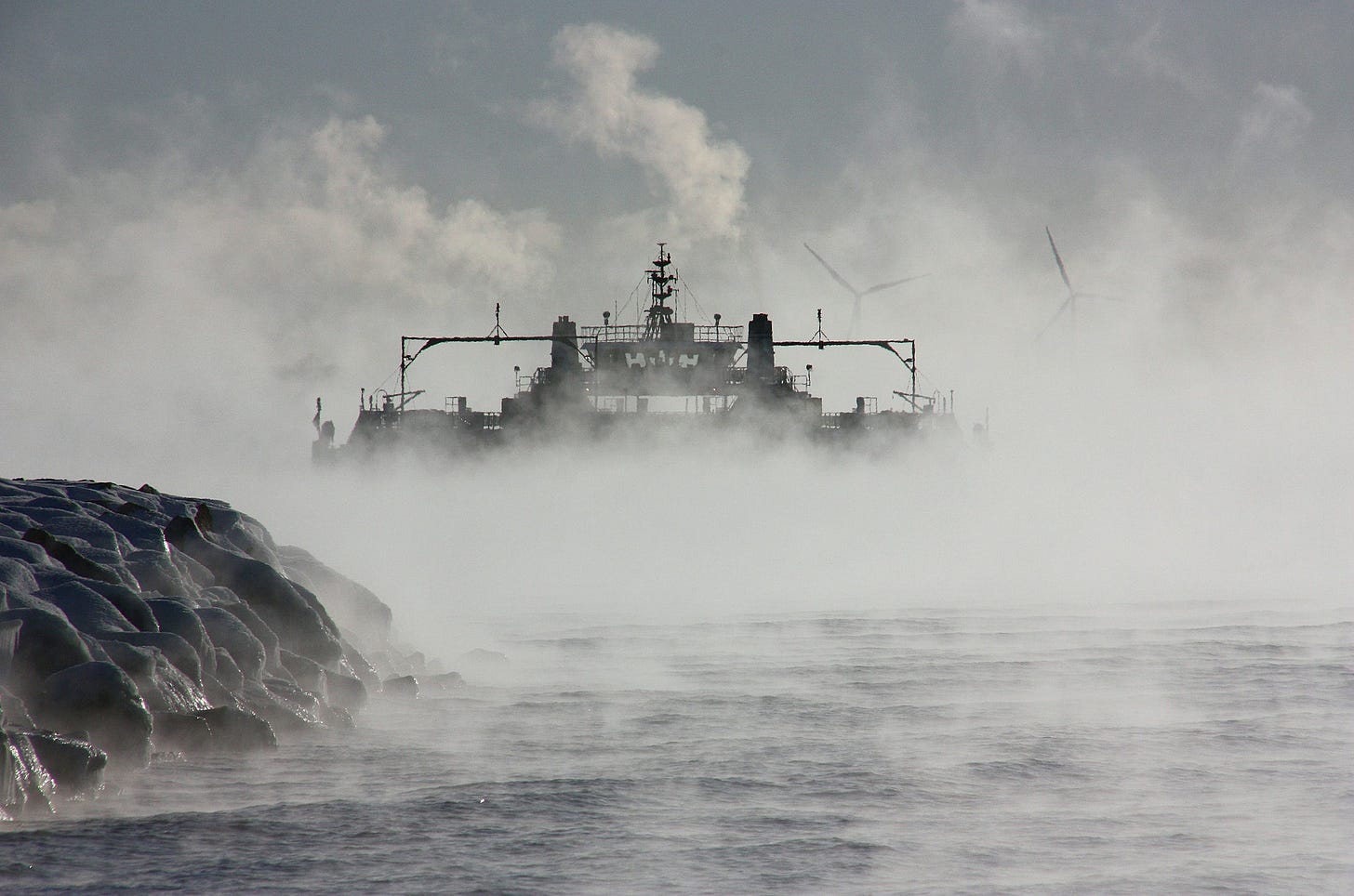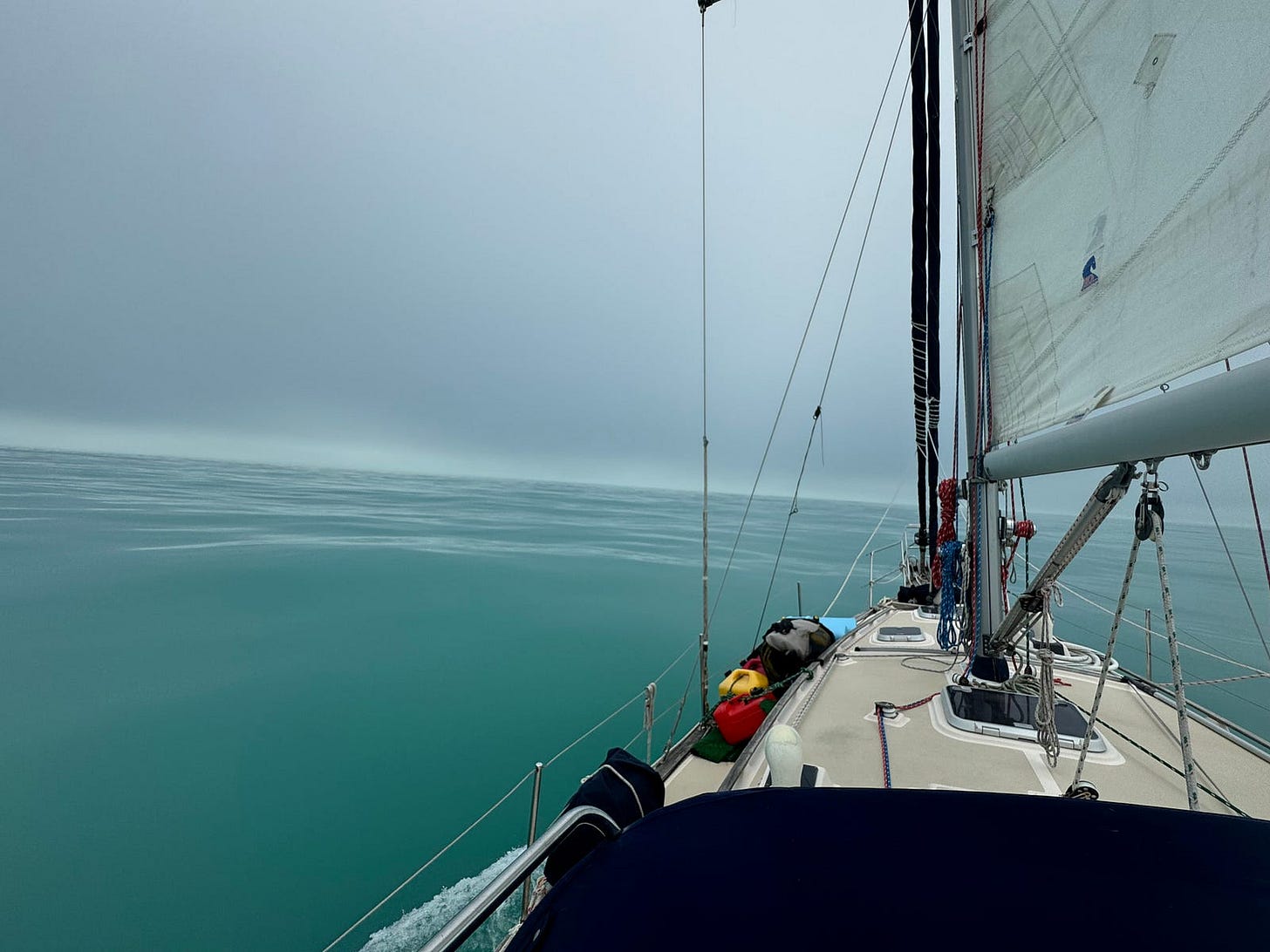Fog Opens New Windows to Old Things
Essay. It is nerve-wrecking when you cannot see the danger, but it is a part of life.
Four days at sea, and I wish to yell “Land-Ho.” Block Island is a mile away, and the low cliffs should be in front of us. I sense them but cannot see. The fog denies the view.
I have not been to Block Island; I only saw its banks from miles away on a prior passage from Newport to Baltimore. The glimpse rooted an idea of tranquil hills and trails, unique architecture, and gorgeous homes afforded by old family money, which were much out of my reach. Idyllic. Yet it won’t be what I imagine. The ideas of a place conjured from a distance fragment up close. The fog lets the perfect island live in my mind for longer.
The fog coalesced from the night’s mist and thickened each hour of the last twelve into an amorphous presence, oppressive and demanding of attention. It drifts in the light wind and snags on our clothes, fuses into droplets, then soaks us. It hides the island behind the thick rolling bands. We know where the land should be, and we are a sufficient distance away from the dangerous rocky shores. But I worry about other things passing through the fog.
The radar plots a boat on a map only a tenth of a mile away. It moves along our course at two knots, then stops and turns to come at us directly, then turns and moves away, stops, and moves again. A fishing boat. It is doing its thing, but to us, it is a menace ready to smash into our side. Alex strains to find it, but the late afternoon sun backlights the thick fog and diffuses into an unbearable brightness impossible to look through.
“The boat is at nine o’clock,” I say.
“No, I have no sight,” Alex says, shaking her head. I honk the fog horn. The blast is without a response.
It is hard to find things in the fog. The eyes search and see nothing concrete, but the mind turns every darker shade into a possibility of trouble, then momentary certainty of a collision, then only a possibility again, which withers into nothing in a cycle of held breaths, clenched fists, relief, and confusion.
The mind enjoys this game in life — summoning ideas from foggy half-facts. At times, it is a gift. It is a launchpad for creative thinking and a journey to find new ways to see. Yet, at others, from little fact, the mind invents betrayals, plots, and conspiracies against you. A misunderstanding builds a recursive spin of imaginary wrongs into a feud. A misheard word at work turns an ally into an enemy plotting your collapse. A partner’s simple dinner with a friend morphs into an affair.
The mind, starved of the full picture in the fog of half-truth, tips each into a hope or an impending doom. In this New England fog, it always chooses danger. That’s for the best.
Bèlá Fleck, the dog, stands up and points his muzzle to where Block Island should be. The tip of his nose shifts from left to right. He smells the land, scrunches his nose, and flares his nostrils. He looks at me in askance. Where is the land, dad?
“You can’t wait to run on the beach, ah?” I ask, and he wiggles with excitement, then sniffs again.
I smell the land too. The essence of wet moss and earth overwhelms but only for an instant, then wafts away. The smell is strong now as it is new after the days of clean ocean air, but tomorrow it will go unnoticed, cancelled from awareness by our minds that prefer novelty.
In a fog, it saves. The basic brain, trained over the geological epochs and waves of extinction, warns us of a new musky smell of a predator, a new faint engine rumble, or a distant foghorn. The new leaps to attention, supersedes the old, and saves your life. Thanks. But then it cheats us.
In a succession of normal days, the subconscious focus on the novel filters from awareness what is always there — the comfort of our lives, the care of our friends, the love of our family—and relegates them to the background, where they slip from notice until a sudden absence jolts us when we stumble in a new hole where a rock of our life has been.
“What’s that?” Alex is stressed like me. She pointed to the sound. It is a low, half-hearted, tone-deaf tuba note.
“A buoy with a fog horn whistle. I see it on the chart. Two hundred feet away, where you point.”
“Can’t see it.”
Nor I. Lost in the fog. My back muscles shoot a ray of pain into my neck and head, and squeeze my lungs. How long have I been tensing? I deepen my shallow breathing and command myself to relax. Never works.
We do what we can control, follow the chart, move at the right speeds, and take no shortcuts between the buoys. Our fear is not of the elements, today we are in harmony with the sea. We fear the bros in backward hats, the credit card captains with the money to rent a center console boat to zoom around, but not the sense to know that their risks also become ours. We hope the fog subdues their urge to feel bigger than they are, and slows them down.
A new engine sound, a flicker of the light that darts from starboard to stern and vanishes behind us. The wake from a boat on a plane slaps us a few seconds later. They cannot see anything. Dumb shits, don’t gamble with our lives.
The inlet into the harbor is near. I re-read the notes on the chart, and expect a straight but narrow channel, well-marked by the red buoys that we must keep on our right, and the green buoys we must pass to our left.
“Securité, securité, securité.” I speak into the radio to announce our intentions to others who cannot see us: “Sailing vessel Monona is approaching the outer red buoy at Salt Pond Inlet from the southwest at 5 knots. Zero-point-five miles out. Any concerned or conflicting traffic, please advise. Standing by on channel one-six.”
The silence is my answer, as is a blue patch of the sky. The sun warms my face, unclenches my hands, and relaxes my back. I breathe again. The blue patch grows and opens wider. I squint then yell “Land-Ho,” a silly cry but a fun homage to the traditions of the past.
The low cliffs of Block Island come into focus through the cinematic lens of the receding fog. I see the beach on the right side of the narrow channel, and the shallows to the left, but a safe passage into a safe harbor in the middle, between the lush green hills.
Four days at sea brought us to a different landscape, new architecture, and a new culture. I intuit a shift with this change—an escape from stasis that opens a new window to old things. The new awareness ousts complacency and softens the mind to accept again, to see a nuance in what it cataloged as understood but that evolved along with you and needs review. A review of views with the newly pliant mind.
Yet, only a change of place is unlikely to give you much. But beating against the sea, stressing through a fog, or walking any path that rattles you enough on the way to the next safe harbor is what teaches to understand.
Please hit the like button if you enjoyed this story. It matters.





Beautiful story. I love how you illustrate the tension and relief of navigating through life’s uncertainties. The journey through the fog, symbolizing life’s challenges, leads to a moment of clarity and new beginnings, reminding us that perseverance and cautious optimism can guide us to safe harbors and fresh perspectives.
Thank you for writing this piece. Sailing isn’t always idyllic. I need the reminders. I’m a romantic!